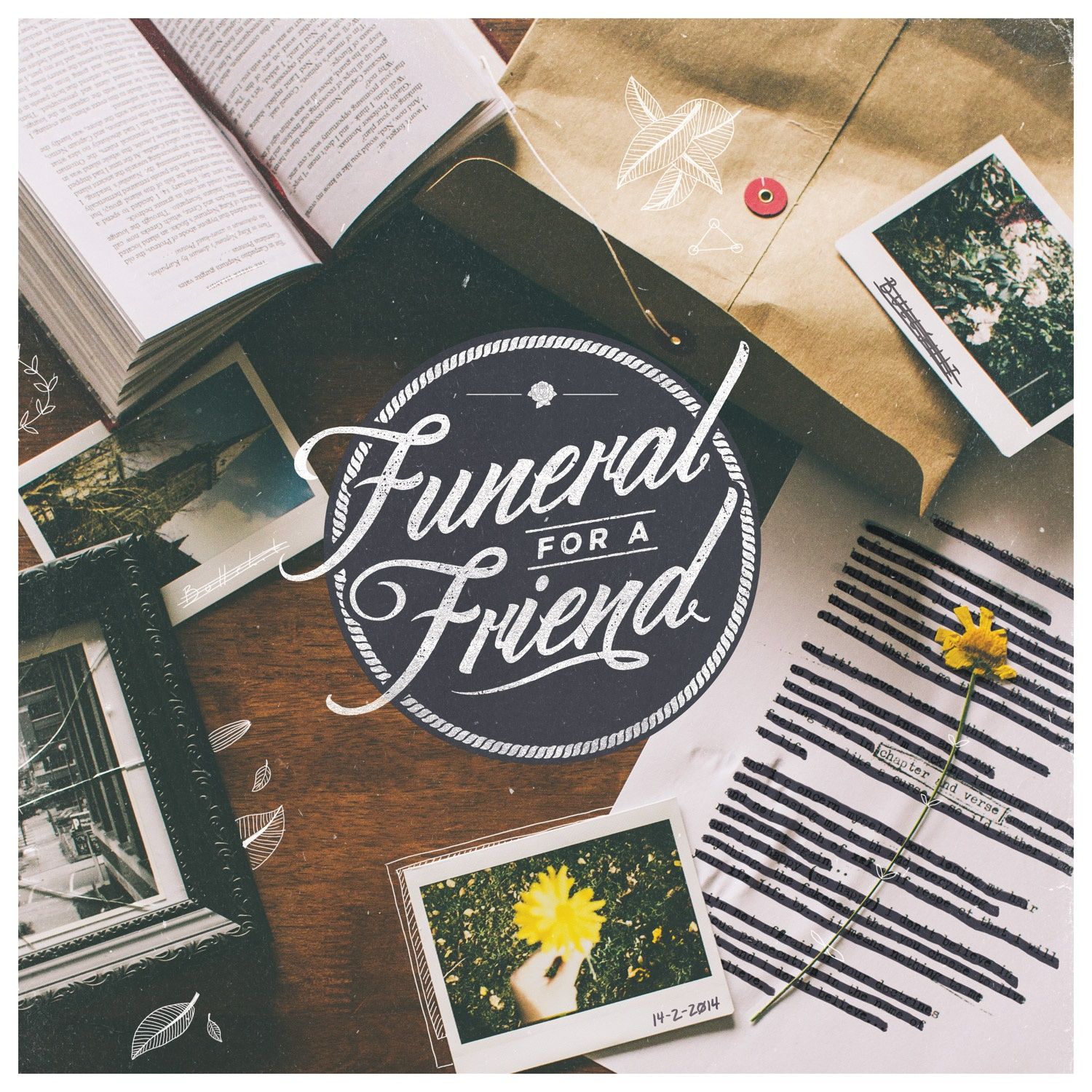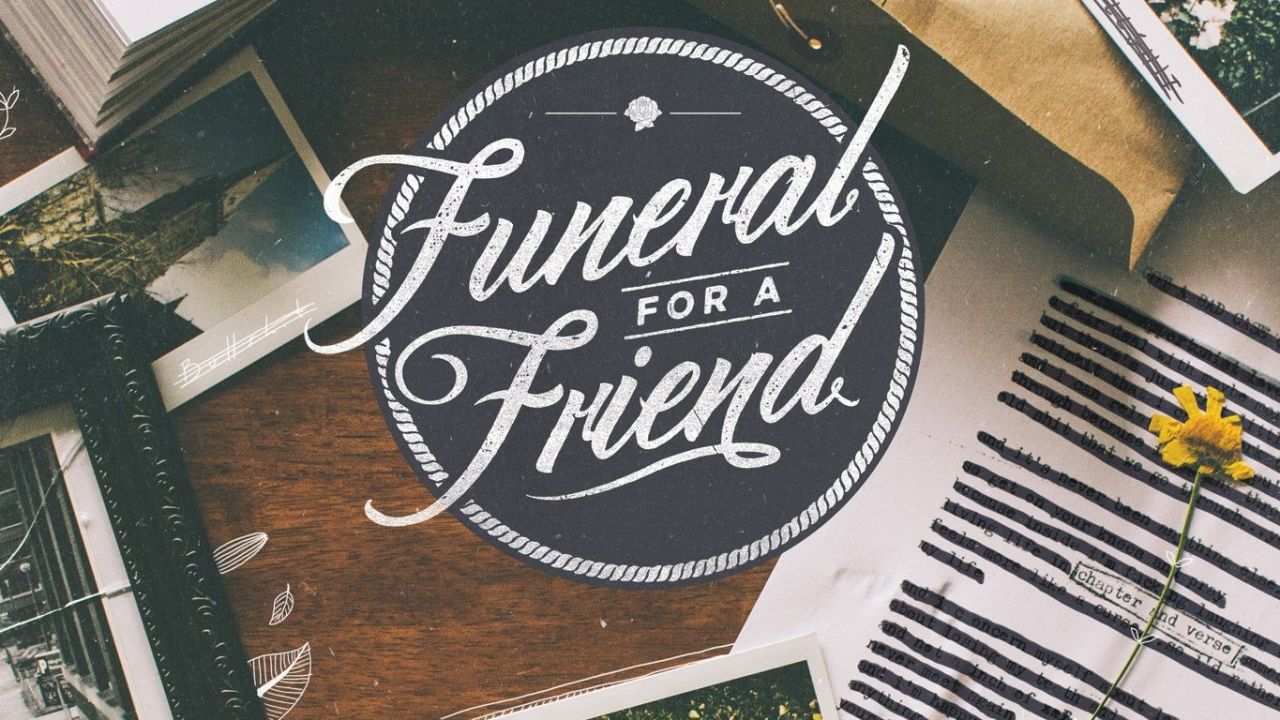‘Chapter And Verse’ is Funeral For A Friend’s latest album and continues the Welsh band’s stunning form that was so in evidence on 2013’s ‘Conduit’. A confident, aggressive blast of melodic punk, hardcore and post-hardcore, it sees the band delve deeply into their roots and influences, while also offering perhaps the most directly political and confrontational lyrics of their career to date. Vocalist Matthew Davies-Kreye guides us through the chapters and verses of this latest release…

**Stand By Me For The Millionth Time **The band’s seventh album kicks off with a barrage of uncompromising, post-hardcore. Its pummelling, driving tune deliberately resists morphing into the catchy song it could so easily be, adding a layer of unsettling unease to the track that makes it that much the stronger and more powerful. “It’s a song that looks back at the kind of person that you maybe wanted to be when you were starting to be informed all the influences that impact your life,” says Matthew, “from when you’re a teenager to the person that you are now. It’s about how that path has been travelled and how strongly you’ve maintained a sense of truth within yourself. It’s about exactly who you are and being happy and comfortable with that.”
**You’ve Got A Bad Case Of The Religions **A blistering, blustery rush of guitars and crashing drums, this song’s lyrics also gave birth to the album title. The verses are break-neck and breathless, but the chorus is pure melodic exaltation that could become of their biggest live sing-alongs. “This is a culmination of all my lyrical relationships and tos-and-fros with religion on the record,” says the vocalist. “I had a very conflicted relationship with it throughout my entire life, from growing up in a religious family to then getting into punk rock in my teenage years and rebelling against it. I tested the waters again in my twenties and realised it’s not for me at this point. But rather than being an out-and-out attack on people’s ideas about religion – and I know some people think it’s in relation to what’s been going on in terms of extremism – but it’s more personal than that.”
**Pencil Pusher Its title might suggest that this rolling, tumbling track – which surges with a desperate conviction, Davies-Kreye’s voice straining and cracking over the tumultuous melody – is about being stuck in a boring 9-5, but it’s more than that. “This is a song about a lack of control of your own destiny, whether it’s your career, your life, personal relationships – anything that’s driving you crazy. For me, it’s a reference to my wife. She works from home and there’s a family a couple of doors down that seem to leave their dog out non-stop and the dog obviously isn’t happy and is always barking – there’s the lyric, ‘I can hear the dog bark behind the house’. It’s a personal interpretation of somebody dealing with aspects that you want to be able to solve but which are out of your control.” **
**You Should Be Ashamed Of Yourself **A hard-edged, driven song that’s one of the more directly political on the record, its angular guitars and crashing crescendo only add to the power of the point it’s making. “It’s a pro-feminist song,” explains Matthew. “Having grown up in the hardcore scene during the heyday of social-political issues like feminism and sexism and rallying against homophobia, I really wanted to address it in a song in a direct way. It’s calling out guys who claim to be feminists and support feminism yet in circles of their friends other people around them are dropping into programmed ideas of sexism. But if you’re aware of these comments and you don’t call them out on it, you’re just adding to the problem.”
**1% **There’s no doubting what this is about. It begins life as a gentle, fragile song, then explodes with the band’s characteristic emotion. It might be political, but it’s wholly personal, and the pounding beat and well of guitars only add to its heartfelt nature. “Obviously, in the last few years there was the economic downturn and the crash,” he notes. “You see the levels of poverty and desperation that occur in everyday life, but also how easily the people who put the financial burden on the country get away with that. I have no qualms presenting something that deals with the qualms of fairness and financial fairness – I’m not affluent, I don’t come from a rich background, I’m not rolling in money, and it’s affected what I do for a living as well. It’s had a knock-on effect across the board, and you see people having to work job-after-job to make ends meet, and the government’s trying to claw back really important support systems from families which allow them to function as a family.”
**After All These Years… Like A Lightbulb Going Off In My Head **Raw and rough and tumble, this song is full of an earnest, naïve energy that bristles with tension, and which blurs the line between melody and atonalism. That vicious conflict is reduced in the middle, the song slowing down to an insistent, almost grungey pace until its end. “That’s a personal song that deals with somebody letting go of all they have in life to search for something else,” explains Matthew. “That could be related to being in a band or following your dreams and not being afraid to make the hard choice. It’s from the viewpoint of two different people – the person who is going to be stuck there and dealing with the idea of not having this person in their life anymore, and the person who wants to make that change and who thinks it’s important for them to get out there and try new things, which, I guess, is selfishly me.”
**Modern Excuse Of A Man **A pure blast of hardcore, this is the fastest, most aggressive song on the album, ripping through in less than two bone-crushing minutes that ends as abruptly as it begins. “It’s a very aggressive song,” says the singer. “It’s one of mine and musically it was influenced by a lot of the ’90s metalcore – bands like Deadguy, Kiss It Goodbye, Drowningman. It was important to have a song like that on the record because it’s unassumingly very direct, doesn’t beat around the bush and lays out pretty much how deep Funeral For A Friend’s hardcore roots go. And lyrically it’s about the excuse of masculinity, the severe misrepresentation of what it is to be a man and how you need to act.”
**Inequality **This song does exactly what it says on the tin, a vicious yet hummable blast of invective and insecurity underpinned by ferocious drums and a jarring, jolting melody. “Inequality is about inequality – simple as,” says Matthew. “It’s a very direct reference to the people in power – the bankers who left us in this financial shitstorm by playing with people’s livelihoods for fun, just because they could. The responsibility that they had to these people’s hard-earned money is brushed over with a smack on the wrists. ‘Don’t worry that I have to work three extra jobs to make ends meet now.’ Excuses, excuses, excuses – things dusted over – bullshit, bullshit, bullshit. But we’ve only got ourselves to blame for not standing up to make a difference when we can.”
**Brother **The one acoustic song on the album, but it’s no ballad. In fact, it’s a tense, quick-paced burst of minor chords full of fire and heart, that’s sad but also defiant. “It’s about my granddad, who passed away a couple of years ago,” he explains. “Basically, it’s from the perspective of somebody who works in an environment where they have to put their trust and faith in somebody every day. My granddad was a miner, so you had that comradery there between friends and colleagues. There was a support system. This is kind of my attempt to figure out my relationship with my granddad later on, towards the end of his life. Being taken away from home with the band a lot, my relationship with him changed drastically and I never got to fully embrace my relationship with him again before he passed away.”

**Donny **Another breakneck rush of melodic hardcore, Donny rushes by with aggressive conviction, drops out for a semi-muted breakdown and then shifts violently back into gear again. “Donny is about tying your brother to a tree in the woods and then forgetting about him for a couple of hours,” laughs Matthew. “Maybe that’s a dark thing, but I think it’s quite funny. I was just about breaking my teenage years and my brother’s like two and a half years younger and he was always following me and my friends around, trying to be in with the kids. Literally, you’d tell him to jump into a bush of nettles and he would. I love my brother to bits, but it was one of those things that just came into my mind and I wrote the lyrics around it. but it’s also about being in a band, being brothers on the road.”
**The Jade Tree Years Were My Best **Funeral For A Friend were never signed the seminal Jade Tree label, but this slow-burning melodic track with its crashing walls of sound could easily be from one of their bands. “Kris [Coombs-Roberts, guitar] wrote the idea for this and when he played it to me I was blown away,” explains the vocalist. “It really reminded me of that time and that period. It got me really excited, because we’re actually paying respect to the bands and music that we love. It’s a love letter to the bands that helped shape us growing up, and the lyrics are a reinterpretation of Soul Asylum’s Somebody To Shove. There’s a reference to waiting by the phone in the lyrics, and there’s one in that song as well. It’s about that time when making music was purely about making music for yourself – you’d hang out with your friends and you’d try to cover bands’ songs and then you’d tentatively write your own songs based on guitar chords you knew from learning these other songs. It’s a golden age reflection on those feelings and it’s probably one of my favourite songs on the album. I love playing it. It’s the right kind of nostalgia for me.”
**Hidden Track (Dead Letters) **You might think, when The Jade Tree Years Were My Best finishes, that that’s it – but no. In just under 30 seconds the intense riffs of the album’s hidden track come bursting through the speakers, followed by Davies-Kreye’s staccato, belligerent shouts, his voice breaking as he screams, “This was all a mistake. I guess I was wrong.” It’s a powerful way to close a record that reaffirms the rebirth of Funeral For A Friend as a true force in British rock music. “We refer to this as Dead Letters,” reveals Matthew. “It could equally be called I Love Mosh. It’s a song that we had that we quickly realised didn’t fit on the album. So rather than let it go to waste, in the spirit of the ’90s albums that had hidden tracks on, we were going throw it in there and see if people picked up on it. It’s just for fun, really. I don’t even know what the song’s about, to be honest with you! It’s just an exercise in mosh parts.”

Funeral For A Friend’s Chapter And Verse is out now. The band are currently on tour. See their website for details.
